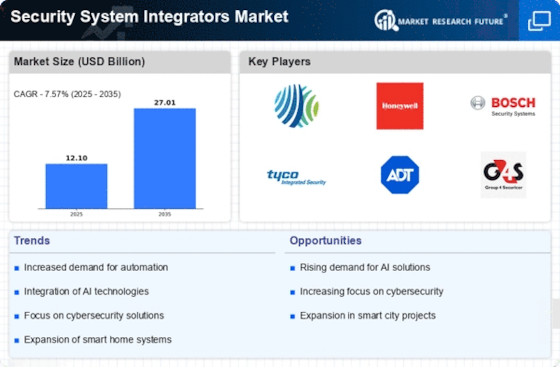Top Industry Leaders in the Security System Integrators Market

Competitive Landscape of Security System Integrators Market:
The Security System Integrators market is witnessing intense competition, driven by the increasing demand for robust security solutions across various industries. Several key players dominate the landscape, each employing distinct strategies to gain a competitive edge.
Key Players:
- Akamai technologies inc (USA)
- Carbon black inc (USA)
- Anchor technologies inc (USA)
- Checkpoint software technologies ltd (Israel)
- Cognizant technology solutions corporation (USA)
- Cisco system inc. (USA)
- Deloitte touche Tohmatsu limited (USA)
- FireEye Inc. (USA)
Strategies Adopted:
- Diversification: Many leading companies are expanding their service portfolios by offering a wide range of integrated security solutions, including access control, video surveillance, and cybersecurity, to cater to the evolving needs of clients.
- Strategic Partnerships: Collaborations with technology providers, software developers, and other stakeholders have become commonplace. These partnerships allow integrators to leverage cutting-edge technologies, enhance their offerings, and provide comprehensive security solutions.
- Global Expansion: The security system integrators are increasingly expanding their geographical footprint to tap into emerging markets. This expansion strategy allows them to capitalize on the growing demand for advanced security solutions in regions with increasing security concerns.
- Focus on Innovation: Companies are heavily investing in research and development to stay at the forefront of technological advancements. Innovations in artificial intelligence, machine learning, and data analytics are being incorporated into security systems to provide more effective and efficient solutions.
Factors for Market Share Analysis:
- Technological Expertise: The level of expertise in integrating and deploying cutting-edge security technologies plays a crucial role in determining market share. Companies with a strong technological foundation are better positioned to offer advanced solutions.
- Client Base: The size and diversity of the client base are indicative of a company's market reach. Security system integrators with a broad and satisfied customer portfolio tend to have a larger market share, as it reflects the ability to meet diverse security requirements.
- Service Quality: The quality of service and customer satisfaction are paramount in the security system integration market. Companies that consistently deliver reliable and effective solutions gain a competitive advantage, leading to a larger market share.
- Cost Competitiveness: The ability to provide cost-effective solutions without compromising on quality is a significant factor influencing market share. Companies that optimize operational efficiency and offer competitive pricing strategies tend to capture a larger market share.
New and Emerging Companies:
- Startups and Niche Players: A wave of startups and niche players is entering the security system integration market, offering specialized solutions or targeting specific industry verticals. These companies often disrupt traditional market dynamics by introducing innovative approaches and technologies.
- Regional Players: Some companies are gaining prominence by focusing on specific regional markets. These regional players understand local nuances and regulations, providing them with a competitive advantage in catering to the unique security requirements of their target regions.
- Cybersecurity Specialists: With the increasing importance of cybersecurity in integrated security solutions, specialized companies focusing solely on cybersecurity aspects are emerging as key players. They often collaborate with broader integrators to enhance overall system security.
Current Company Investment Trends:
- Cybersecurity Capabilities: A notable trend is the increased investment in cybersecurity capabilities. As the threat landscape evolves, companies are allocating resources to strengthen their cybersecurity offerings, ensuring comprehensive protection against cyber threats.
- Artificial Intelligence and Analytics: Investments in artificial intelligence and analytics capabilities are on the rise. Integrators are leveraging these technologies to enhance the intelligence and automation of security systems, providing more proactive and predictive security measures.
- Cloud-Based Solutions: The adoption of cloud-based security solutions is a prevalent trend. Companies are investing in cloud infrastructure and services to offer scalable, flexible, and remotely accessible security solutions, meeting the demands of modern businesses.
- Mergers and Acquisitions: The market is witnessing a series of mergers and acquisitions as companies seek to consolidate their positions and expand their service capabilities. M&A activities are often driven by the desire to acquire specialized skills, enter new markets, or strengthen overall service offerings.
Latest Company Updates:
Major participant in the security industry Bosch Building Technologies has stated that it will be selling off its Building Technologies security product companies in 2023 in order to concentrate on systems integration and service provision. The corporation has confirmed that its video, access and intrusion, and communication portfolios are included in the planned sale of its products division, affecting more than 4,000 people.
Commvault®, the first data protection vendor to introduce cyber deception and a pioneer in enterprise data protection for modern global enterprises, unveiled enhanced security capabilities for its complete portfolio in 2023.
Finally, in 2023, Google's cooperation with ADT will have a new home security solution to offer. The latest do-it-yourself home security system, ADT Self Setup, is compatible with Nest cameras, smart TVs, thermostats, which can be controlled from mobile app.










